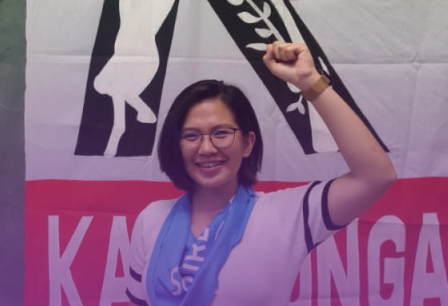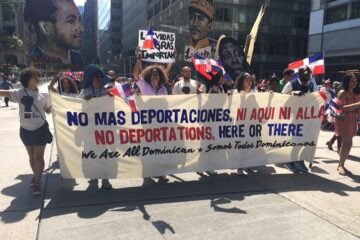Clarissa Mendoza is the National Secretariat Head of the Movement for Agrarian Reform and Social Justice [Kilusan para sa Repormang Agraryo at Katarungang Panlipunan – Katarungan], a Philippine mass movement of agrarian reform beneficiaries, indigenous peoples, upland settlers, peasants, and others working in the rural area. She talked to Capire about the Philippine political context of authoritarianism and resistance of peasant women in the country.
In 2022, the presidential elections made Ferdinand Marcos Jr. (known as Bongbong Marcos) the new president of the country. Bongbong Marcos is the son of the former dictator ousted in 1986 by the People Power Revolution. According to Clarissa, the new government tries to project itself to be prioritizing local farmers, but in reality, it is the contrary. In the first quarter of 2023, Philippines encountered the highest inflation rate in 14 years at 8.7%. “People struggle to get their food, to have money for their sustenance, including the most underprivileged sector in our country, the peasants”, she says.
*
How is the resistance of women’s peasants in this context of authoritarianism?
Women in the Philippines continue to resist. Peasant women continue to take leadership roles in their respective organizations. In addition, there have been initiatives fighting against the anti-terrorism law, that ironically terrorizes those individuals who resist and advocate for human rights and other causes. There’s also been continuous initiatives for land rights, specifically for the just implementation of agrarian reform. For the past few decades, one of our main issues is on land utilization. There is no comprehensive land use law in the Philippines, and that’s why many organizations are advocating for its passage.
Women in the Philippines continuously fight for their lands, together with their husbands, their communities, their children as well. Women, including the youth, do not stop fighting for their rights.
Can you share with us how the land policies in the Philippines are and what Katarungan is proposing now?
One of the provisions in our Constitution states that the national industrialization of our country should be based on sound agricultural development and agrarian reform. This means that agriculture and agrarian reform are sectors considered to be in the forefront of our economic development. Unfortunately, this is not the case.
Aside from the Constitution, there are also different laws on agrarian reform. One of which was the Comprehensive Agrarian Reform Program (CARP), passed in 1988, and its version with amendments passed in 2009. These laws talk about land acquisition, distribution, among others, and prior to this, there were existing agrarian laws but with limited scope. These laws were fundamental for the peasant movement in the Philippines as we all know that land is very important for our production and of course in obtaining food self-sufficiency.
There are sections in those laws that are really helpful for our peasants, but there are also specific sections of those laws that are not properly implemented. One of which is the Section 19 of the CARPER law, which entails the use of referral system because the cases filed against farmers should not be tried in normal courts. When the cases are agrarian in nature, they should be treated separately. At Katarungan, we think that this specific section was not implemented accordingly, because there have been many cases of farmers being criminalized just because they are fighting for their lands. The government of the Philippines should review this section, review the overall implementation of agrarian reform as well as the provision of support services.
It’s not enough to just give the land. You also need to make the farmers have the capacity to till and be productive using the land. This is related to the use of support services, and of course the need for legal support for our farmers. For the past few years there have been many corporations fighting trumped up charges against farmers. So, the government must be proactive in providing legal assistance to our farmers.
In a lot of territories, women are also struggling to denounce this context of alliance between the government and transnational corporations and the exploitation of land and resources. How does it happen in Katarungan?
Peasant women are at the forefront of fighting for their lands against corporations. In the cases in Quezon and in Bataan, they face threats, human rights violations, and continuous mental anguish and harassment of corporations. In the case of Sumalo, Bataan, in which nine farmers were charged, eight of them were women, and four are already senior citizens. They were charged with a false accusation of syndicated estafa, and now they have a standing warrant of arrest, a threat to their liberty and all their freedoms. They are innocent, their families were affected, their capacity to fight for their lands was really affected.
This is the effort of corporations to weaken the resistance of our women, the resistance of our leaders, and of the peasant in general. The government should always ensure that this type of injustice does not happen. We, as a national movement, really need to expose this kind of injustice in our country and of course we need the help of other movements and organizations in all parts of the world to expose this global phenomenon.
Can you comment about the feminist struggles in the Philippines and how the women peasants get involved in it?
In terms of legislation for the past few months, there have been efforts to discuss anti-discrimination and issues on how to define electronic violence. This is in the context of the influence of social media in our lives and many issues of harassment to children and women especially during the height of the pandemic and in rural areas. In addition, there have been many collaborations among organizations to help criminalized women farmers and criminalized farmers in general. In the Philippines, there are still many issues that we need to work on, but there are existing efforts that must be sustained and strengthened.
For the movements and organizations in the Philippines, it’s very important to strengthen collaboration, to work on legislation, and give urgent response to criminalized farmers.
The criminalization of farmers, especially women, have affected many families and threatened communities. I also call the attention of the youth to answer the call. We need to act in these situations where the lives of many people are at the mercy of corporations. We need to act in this situation of violence and injustice. We the youth, we have the energy, we have the skills. We don’t want to have that kind of world where everyone is dying, everyone is suffering from hunger, everyone is just experiencing injustice just because they don’t have money unlike corporations. So, to my fellow youth, please stand up, take the chance, take the challenge. I know that together with other sectors of the community, we can fight against corporations, we can fight against repressive governments.




